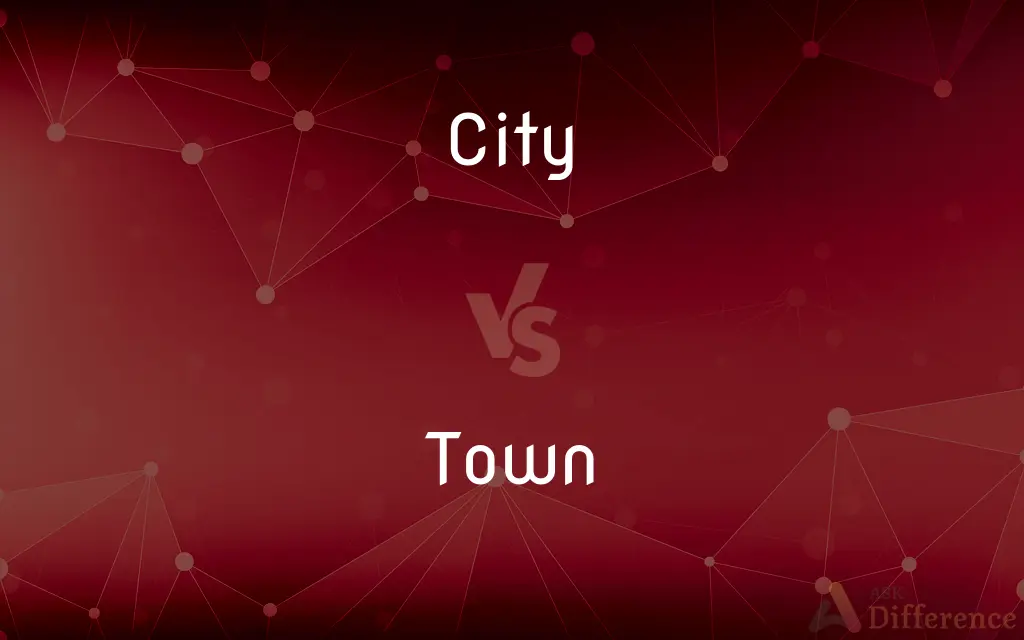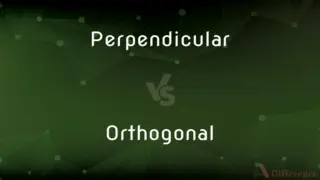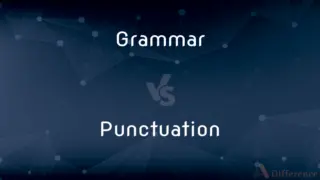City vs. Town — What's the Difference?
By Tayyaba Rehman — Updated on September 27, 2023
A "City" is generally a large or important municipality, typically having corporate status and powers of self-government. A "Town" is generally smaller, with fewer inhabitants and less extensive infrastructure and services.

Difference Between City and Town
Table of Contents
ADVERTISEMENT
Key Differences
The distinction between "City" and "Town" is often related to their size, governance, and socioeconomic structures. A city is usually a large, densely populated urban area with extensive infrastructure, services, and cultural activities, often having a structured form of government and administrative frameworks. It’s characterized by diversity, dynamism, and economic significance, acting as a hub for commerce, education, and entertainment. Conversely, a town is generally smaller, less densely populated, and may have fewer amenities and services, often exuding a more intimate, communal atmosphere, with simpler governance structures and less economic complexity.
In terms of governance and administration, cities usually have elaborate, structured governance mechanisms, including mayoral and city council systems, addressing the extensive needs and complexities of the larger population. Towns typically have simpler, more direct forms of governance, reflecting the smaller scale and lesser complexities of town life, possibly with town meetings where residents can directly participate in decision-making processes.
Culturally and socially, cities are often melting pots of diversity, offering a wide range of cultural activities, entertainment options, and social services, attracting individuals seeking opportunities, experiences, and lifestyle choices. Towns, being smaller, may offer fewer cultural and entertainment options but often compensate with a stronger sense of community, closer relationships among residents, and a more relaxed pace of life.
Economically, cities are usually centers of economic activity, hosting a wide array of industries, businesses, and educational institutions, offering diverse employment opportunities and acting as engines of economic growth and innovation. Towns, with their smaller scale, may have more limited economic activities, often centered around local businesses, services, and agriculture, offering a quieter, more communal living experience.
Comparison Chart
Size and Population
Larger, densely populated.
Smaller, less densely populated.
ADVERTISEMENT
Governance
Structured governance with mayoral and city council systems.
Simpler governance, possibly with town meetings.
Cultural Activities
Diverse cultural activities and entertainment options.
Fewer cultural and entertainment options.
Economic Activity
Economic hub with diverse industries and employment options.
Limited economic activities, often local businesses.
Community Atmosphere
Dynamic, diverse, possibly less intimate.
More intimate, stronger sense of community.
Compare with Definitions
City
A City is typically characterized by economic diversity and dynamism.
The city offers various employment opportunities in different sectors.
Town
A Town may have limited economic activities and employment options.
The town relies heavily on local businesses and agriculture.
City
A City is usually densely populated and can be less intimate.
Living in the city can sometimes feel isolating despite the crowds.
Town
A Town is a smaller urban area, typically with a close-knit community.
Life in the town is quieter and more relaxed.
City
A City offers a range of cultural activities, services, and entertainment options.
The city boasts numerous museums, theaters, and restaurants.
Town
A Town is characterized by a more intimate, communal atmosphere.
Everyone in the town knows each other and relationships are close.
City
A city is a large human settlement. It can be defined as a permanent and densely settled place with administratively defined boundaries whose members work primarily on non-agricultural tasks.
Town
A town is a human settlement. Towns are generally larger than villages and smaller than cities, though the criteria to distinguish between them vary considerably in different parts of the world.
City
A large town
One of Italy's most beautiful cities
The city council
Town
A population center that is larger than a village and smaller than a city.
City
Short for City of London
Town
A territorial and political unit governed by a town meeting, especially in New England.
City
A center of population, commerce, and culture; a town of significant size and importance.
Town
(Informal) A city
New York is a big town.
City
An incorporated municipality in the United States with definite boundaries and legal powers set forth in a charter granted by the state.
Town
Chiefly British A rural village that has a market or fair periodically.
City
A Canadian municipality of high rank, usually determined by population but varying by province.
Town
The residents of a town
The whole town was upset at the news.
City
A large incorporated town in Great Britain, usually the seat of a bishop, with its title conferred by the Crown.
Town
An area that is more densely populated or developed than the surrounding area
Going into town to shop.
City
The inhabitants of a city considered as a group.
Town
The residents of a community in which a university or college is located, as opposed to the students and faculty
A dispute pitting town against gown.
City
An ancient Greek city-state.
Town
A group of prairie dog burrows.
City
(Slang) Used in combination as an intensive
The playing field was mud city after the big rain.
Town
A settlement; an area with residential districts, shops and amenities, and its own local government; especially one larger than a village and smaller than a city, historically enclosed by a fence or walls, with total populations ranging from several hundred to more than a hundred thousand (as of the early 21st century)
This town is really dangerous because these youngsters have Beretta handguns.
City
City The financial and commercial center of London. Used with the.
Town
Any more urbanized centre than the place of reference.
I'll be in Yonkers, then I'm driving into town to see the Knicks at the Garden tonight.
City
A large settlement, bigger than a town; sometimes with a specific legal definition, depending on the place.
São Paulo is the largest city in South America.
Town
A rural settlement in which a market was held at least once a week.
City
(UK) A settlement granted special status by royal charter or letters patent; traditionally, a settlement with a cathedral regardless of size.
Town
The residents (as opposed to gown: the students, faculty, etc.) of a community which is the site of a university.
City
(Australia) The central business district; downtown.
I'm going into the city today to do some shopping.
Town
(colloquial) Used to refer to a town or similar entity under discussion.
Call me when you get to town.
City
(slang) A large amount of something used after the noun.
It’s video game city in here!
Town
A major city, especially one where the speaker is located.
City
A large town.
Town
(legal) A municipal organization, such as a corporation, defined by the laws of the entity of which it is a part.
City
A corporate town; in the United States, a town or collective body of inhabitants, incorporated and governed by a mayor and aldermen or a city council consisting of a board of aldermen and a common council; in Great Britain, a town corporate, which is or has been the seat of a bishop, or the capital of his see.
A city is a town incorporated; which is, or has been, the see of a bishop; and though the bishopric has been dissolved, as at Westminster, it yet remaineth a city.
When Gorges constituted York a city, he of course meant it to be the seat of a bishop, for the word city has no other meaning in English law.
Town
(obsolete) An enclosure which surrounded the mere homestead or dwelling of the lord of the manor; by extension, the whole of the land which constituted the domain.
City
The collective body of citizens, or inhabitants of a city.
Town
A farm or farmstead; also, a court or farmyard.
City
Of or pertaining to a city.
Town
London, especially central London.
City
A large and densely populated urban area; may include several independent administrative districts;
Ancient Troy was a great city
Town
Formerly: (a) An inclosure which surrounded the mere homestead or dwelling of the lord of the manor. [Obs.] (b) The whole of the land which constituted the domain. [Obs.] (c) A collection of houses inclosed by fences or walls.
City
An incorporated administrative district established by state charter;
The city raised the tax rate
Town
Any number or collection of houses to which belongs a regular market, and which is not a city or the see of a bishop.
City
People living in a large densely populated municipality;
The city voted for Republicans in 1994
Town
Any collection of houses larger than a village, and not incorporated as a city; also, loosely, any large, closely populated place, whether incorporated or not, in distinction from the country, or from rural communities.
God made the country, and man made the town.
City
A City is a large and significant urban area with extensive infrastructure.
The city is bustling with activity during the day.
Town
The body of inhabitants resident in a town; as, the town voted to send two representatives to the legislature; the town voted to lay a tax for repairing the highways.
City
A City has structured forms of governance and administration.
The city council passed a new ordinance to regulate traffic.
Town
A township; the whole territory within certain limits, less than those of a country.
Town
The court end of London; - commonly with the.
Town
The metropolis or its inhabitants; as, in winter the gentleman lives in town; in summer, in the country.
Always hankering after the diversions of the town.
Stunned with his giddy larum half the town.
Town
A farm or farmstead; also, a court or farmyard.
Town
An urban area with a fixed boundary that is smaller than a city;
They drive through town on their way to work
Town
An administrative division of a county;
The town is responsible for snow removal
Town
The people living in a municipality smaller than a city;
The whole town cheered the team
Town
A Town usually has simpler governance structures and direct forms of administration.
The town meeting is held monthly to discuss community issues.
Town
A Town generally offers fewer cultural activities and entertainment options.
The town has a small community theater and a local museum.
Common Curiosities
Is a city generally larger than a town?
Yes, a city is generally larger and more populated than a town.
Is the governance structure in cities more complex than in towns?
Generally, yes. Cities often have more structured and elaborate governance structures compared to the simpler forms in towns.
Are economic activities in towns usually more limited and localized than in cities?
Yes, towns generally have more limited, localized economic activities compared to the diverse industries found in cities.
Does a town typically have a closer sense of community compared to a city?
Yes, towns typically have a closer, more intimate sense of community compared to cities.
Do cities offer more cultural activities and entertainment options than towns?
Typically, yes. Cities usually offer a wider range of cultural activities and entertainment options compared to towns.
Do towns generally have smaller populations than cities?
Yes, towns generally have smaller, less dense populations compared to cities.
Can living in a city be less intimate and more isolating compared to living in a town?
Yes, cities, due to their size and diversity, can sometimes feel less intimate and more isolating compared to the close-knit communities in towns.
Are cities typically more diverse and dynamic compared to towns?
Yes, cities are typically characterized by greater diversity, dynamism, and complexity compared to towns.
Share Your Discovery

Previous Comparison
Perpendicular vs. Orthogonal
Next Comparison
Grammar vs. PunctuationAuthor Spotlight
Written by
Tayyaba RehmanTayyaba Rehman is a distinguished writer, currently serving as a primary contributor to askdifference.com. As a researcher in semantics and etymology, Tayyaba's passion for the complexity of languages and their distinctions has found a perfect home on the platform. Tayyaba delves into the intricacies of language, distinguishing between commonly confused words and phrases, thereby providing clarity for readers worldwide.















































